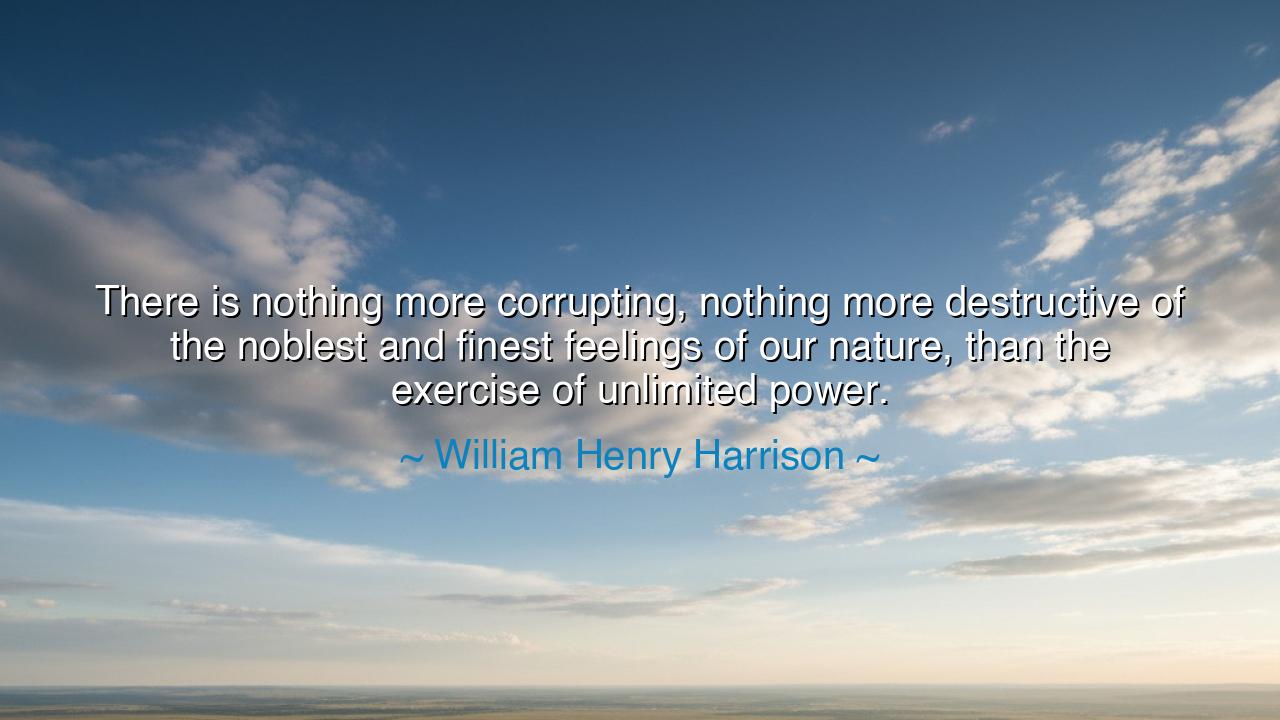
There is nothing more corrupting, nothing more destructive of
There is nothing more corrupting, nothing more destructive of the noblest and finest feelings of our nature, than the exercise of unlimited power.






The words of William Henry Harrison strike like a warning carved upon stone: “There is nothing more corrupting, nothing more destructive of the noblest and finest feelings of our nature, than the exercise of unlimited power.” In these words, we hear not only the judgment of a statesman, but the echo of a truth known since the dawn of civilizations—that unchecked power erodes the soul. For when one holds dominion without restraint, pride swells, compassion fades, and the delicate virtues that bind us to one another are devoured by the hunger to command.
The origin of this wisdom lies in the ancient struggles between rulers and the ruled. Kingdoms have risen and fallen upon the balance of authority. When power is bounded by law, custom, and conscience, it may serve as a shield, protecting the weak and guiding the strong. But when it becomes unlimited power, unrestrained by justice or humility, it transforms even noble hearts into tyrants. Harrison, a leader schooled in the early days of the American republic, knew well that freedom survives only when authority is held in check, lest it corrode the very humanity of those who wield it.
History furnishes us with grim reminders. Consider the tale of Nero, emperor of Rome, who began his reign with promise and favor but, intoxicated by unchecked authority, descended into cruelty, excess, and madness. In his grasping after absolute dominion, he destroyed not only his people’s trust but his own dignity. Or ponder the fall of the French Revolution’s heroes, who, having broken the chains of monarchy, themselves forged the guillotine of terror when their unlimited power consumed their ideals. Each tale is a mirror of Harrison’s warning: that the danger lies not in power itself, but in the lack of boundaries that preserve our nobility.
Yet even amidst these dark examples, the contrast shines all the brighter when we recall leaders who embraced limits to their authority. George Washington, after leading a revolution, might have crowned himself king. But he chose instead to step down, to lay aside power for the sake of liberty. In that act, he preserved not only the young republic but also his own honor, proving that the truest greatness is found in restraint. For where unlimited authority corrupts, self-limitation purifies and ennobles.
Harrison’s words also speak to the soul of the individual. Each of us, in small ways, wields power—over our children, our work, our communities. When left unchecked, even this small authority can corrupt: a parent who rules through fear, a leader who silences dissent, a teacher who crushes rather than uplifts. It is not the scale of power that matters, but the spirit in which it is exercised. Without humility and boundaries, the finest feelings of our nature—love, compassion, mercy—become twisted into domination.
The lesson for future generations is thus clear: seek not unlimited power, but tempered power, guided by justice, balanced by accountability, and softened by mercy. For in this balance lies the preservation of our humanity. Remember always that true strength is not the ability to command without question, but the wisdom to listen, to limit oneself, and to use authority for the service of others rather than for self-exaltation.
Practically, let each of us build limits into our lives. Welcome counsel; allow others to question you. Hold yourself to laws and principles that are higher than your own desires. When entrusted with leadership, measure success not by how much you control, but by how much you uplift. And when temptation whispers that you could hold all power, remember Harrison’s warning—that in such possession lies the ruin of the soul.
Thus, carry this teaching as the ancients carried sacred tablets: that unchecked authority is poison to the heart. Guard yourself and your communities against its corruption. For it is better to walk humbly with measured power than to stride proudly with unlimited power, only to find that in gaining the world, you have lost your very nature.






AAdministratorAdministrator
Welcome, honored guests. Please leave a comment, we will respond soon